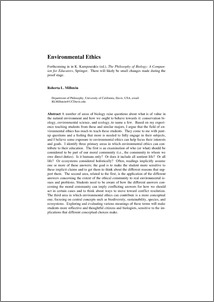Millstein, Roberta L.
(2013)
Environmental Ethics.
[Preprint]
![[img]](https://philsci-archive.pitt.edu/style/images/fileicons/application_pdf.png)  Preview |
|
PDF
Millstein2013-EnvironmentalEthics.pdf
- Accepted Version
Download (275kB)
|
Abstract
A number of areas of biology raise questions about what is of value in the natural environment and how we ought to behave towards it: conservation biology, environmental science, and ecology, to name a few. Based on my experience teaching students from these and similar majors, I argue that the field of environmental ethics has much to teach these students. They come to me with pent-up questions and a feeling that more is needed to fully engage in their subjects, and I believe some exposure to environmental ethics can help focus their interests and goals. I identify three primary areas in which environmental ethics can con- tribute to their education. The first is an examination of who (or what) should be considered to be part of our moral community (i.e., the community to whom we owe direct duties). Is it humans only? Or does it include all sentient life? Or all life? Or ecosystems considered holistically? Often, readings implicitly assume one or more of these answers; the goal is to make the student more sensitive to these implicit claims and to get them to think about the different reasons that support them. The second area, related to the first, is the application of the different answers concerning the extent of the ethical community to real environmental issues and problems. Students need to be aware of how the different answers concerning the moral community can imply conflicting answers for how we should act in certain cases and to think about ways to move toward conflict resolution. The third area in which environmental ethics can contribute is a more conceptual one, focusing on central concepts such as biodiversity, sustainability, species, and ecosystems. Exploring and evaluating various meanings of these terms will make students more reflective and thoughtful citizens and biologists, sensitive to the implications that different conceptual choices make.
Monthly Views for the past 3 years
Monthly Downloads for the past 3 years
Plum Analytics
Actions (login required)
 |
View Item |



